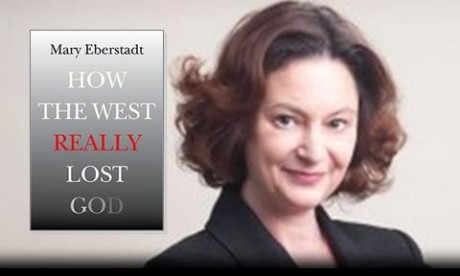Traditional theories of secularization maintain that religious decline led to the deterioration of the family. Not so, argues Mary Eberstadt in her new book How the West Really Lost God: A New Theory of Secularization (Templeton Press, 2013). Eberstadt is a leading cultural critic and a senior fellow at the Ethics and Public Policy Center in Washington, DC. Her books include Adam and Eve after the Pill: Paradoxes of the Sexual Revolution (2012); The Loser Letters: A Comic Tale of Life, Death, and Atheism (2010); and Home-Alone America: The Hidden Toll of Day Care, Behavioral Drugs, and Other Parent Substitutes (2005). Recently, Catholic World Report caught up with Eberstadt and discussed the book and the theory of secularization it presents.
CWR: Why did you set out to write this book—what initially triggered your thinking on secularization in the West?
Eberstadt: Like other Americans who’ve travelled to Europe, I’ve been impressed repeatedly by how secular and non-Christian and sometimes anti-Christian the Continent has become. Empty pews and sparsely attended Masses; cathedrals that house far more tourists than pilgrims; elderly altar-servers in childless churches: these are just a few snapshots of what some call the ongoing de-Christianization of Europe.
The question of why this dramatic decline has happened seemed worth some time and thought, so I started looking into it. And the first interesting fact to emerge was that the standard ways of explaining secularization don’t hold up, as the opening chapters of the book go to show.
Affluence alone doesn’t drive out God, for example, and neither does education or rationalism or other purported causal factors that don’t hold up upon inspection. The very phenomenon of secularization came to feel more and more like a great and intriguing jigsaw puzzle. How the West Really Lost God is an attempt to re-arrange the pieces into a better fit. Continue reading
Sources
Additional reading
News category: Features.




